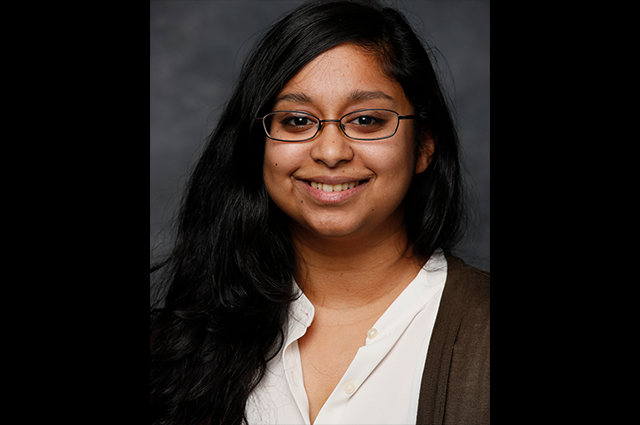Mohanty named Clare Boothe Luce Assistant Professor

New faculty member Aseema Mohanty has been appointed to the Clare Boothe Luce Professorship in Electrical and Computer Engineering at Tufts University. Funded by the Clare Boothe Luce Program of the Henry Luce Foundation, this professorship provides support to new faculty members like Mohanty and fellow Clare Boothe Luce Assistant Professor Elaine Schaertl Short from the Department of Computer Science.
Mohanty received her PhD and MS in electrical and computer engineering from Cornell University, and her BS in electrical science and engineering from MIT. After she completed her PhD in 2017, she pursued postdoctoral research at Columbia University, where she continued her study of the design, fabrication, and application of silicon-based nanophotonic devices for neuroscience and quantum information systems.
Mohanty uses nanophotonics and engineered light-matter interactions to create miniaturized high-performance optical circuits that can sense, shape, and control light. Her work with chip-scale optical devices brings together fields like neuroscience, 3D optical beam shaping, quantum information, emerging computation systems, and implantable and wearable biomedical sensors.
Mohanty was selected as a Rising Star in EECS in 2017. Her honors include a National Science Foundation Graduate Research Fellowship from 2012-2015, Cornell University’s Diversity Programs in Engineering Graduate Student Award in 2012, and the Lester B. Knight Graduate Fellowship in 2011-2012.
The Clare Boothe Luce Professorship is part of the Clare Boothe Luce Program, one of the single most significant sources of private support for women in science, mathematics, and engineering in higher education in the United States. Clare Boothe Luce was a playwright, journalist, U.S. ambassador to Italy, and the first woman elected to Congress from Connecticut. In her bequest establishing this program, she sought “to encourage women to enter, study, graduate, and teach” in science, mathematics and engineering. To date, the program has supported more than 2,500 women in STEM fields.
For more than 80 years, the Henry Luce Foundation has invested in knowledge makers and ensured that their work informs public discussion. This commitment to public knowledge derives from founder Henry R. Luce’s, husband of Clare Boothe Luce and creator of Time magazine, mission to disseminate vital news, ideas, analysis, and criticism to a mass audience.
Today, the Luce Foundation carries on this work by supporting projects at universities, policy institutes, media organizations, and museums, among many others. Hundreds of organizations have received more than 5,800 grants totaling over $1 billion since the foundation’s establishment in 1936.
Department:
Electrical and Computer Engineering